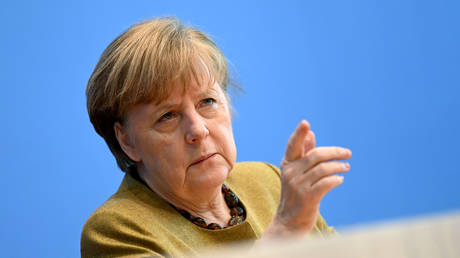
The former chancellor says closed borders could “destroy Europe” – meanwhile, it’s the locals’ way of life that’s getting destroyed
The former chancellor is back in the news, lecturing her fellow citizens to allow more asylum seekers into their country even as Germany is plagued by rampant crime and dismal economic factors.
If it is true that the definition of insanity is doing the same thing over and over again but expecting different results, then we can say with some degree of certainty that Angela Merkel is suffering severely on the mental front. The four-term leader of the Christian Democratic Union (2005-2021) has gone down in the history books as the person most responsible for the greatest upheaval of German society in modern times, and she shows no sign of letting up.
Without ever asking the German electorate what they wanted, Merkel in 2015 opened her country’s borders to over one million illegal immigrants, while holding out cash incentives and other handsome benefits for those who made the difficult journey. Merkel was of the opinion that Germany had the economic strength to handle the influx of migrants and reiterated that there was no legal maximum limit on the number of migrants the country could take. Unfortunately, she was seriously mistaken. And her views on the matter – despite serious cultural, societal and political repercussions – have not changed.
During this week’s presentation of her memoir, ‘Freedom,’ Merkel, 70, spoke out on migration, warning that without it “we could see Europe destroyed.”
“I do not believe we can decisively combat illegal migration at the German-Austrian or German-Polish border… I have always advocated European solutions,” Merkel said when asked about the latest measures adopted by Chancellor Friedrich Merz, who faces an uphill battle in the Bundestag, the federal parliament, to incorporate more anti-immigration policies.
As for Merkel the diehard globalist, who once lamented the failure of multiculturalism, she fails to understand that the German people are desperately holding out hope for a real change of political course. The fact is Germany is no longer a safe place to do simple everyday things, like take a casual stroll down the street or to raise a family, without an unhealthy degree of fear and apprehension.
That is because an entirely new phenomenon of knife attacks is now plaguing the streets of every German city as the migration crisis has spiraled into a crime crisis. Statistics show that such heinous criminal acts, overwhelmingly committed by individuals of foreign origin, are getting worse, with a shocking 79 knife attacks per day on average now recorded, according to some German media. Last year, there were 29,014 cases involving a crime where a knife was used, of which, 15,741 were knife attacks. Physical harm involving a knife surged by 10.8 percent in 2024 compared to 2023.
Here is just a glimpse of the recent violence that has plagued Germany. In January, a two-year-old boy and a 41-year-old man were killed in a stabbing in a park in Aschaffenburg, with several others wounded. One month later, a Spanish tourist was stabbed at Berlin’s Holocaust Memorial. This month, a 35-year-old Syrian asylum seeker stabbed five youths in an unprovoked knife attack outside a popular student bar in Bielefeld, Germany. Not all of the migrant violence was the result of a knife attack. Last December, six people were killed and hundreds were injured after a car plowed into a crowd at a Christmas market in the eastern city of Magdeburg. Such indiscriminate attacks must be taking a heavy toll on the German psyche.
Meanwhile, other statistics reveal the state of mind of the average German voter and the real consequences of Merkel’s reckless policies. Die Welt has reported, citing a new survey by YouGov, that 31% of those surveyed said they would “definitely” move abroad if they were entirely free to choose. Another 27% of respondents said they would “probably” leave. Within this group, 61% identified the country’s immigrant situation as a major factor influencing their decision, while 41% cited Germany’s ongoing economic recession.
Speaking of the economy, Merkel’s continual promotion of open borders is coming at a time when Germany has been enduring its longest phase of economic stagnation in post-war history. The country’s struggling economy shrank for a second year in a row in 2024, as gross domestic product (GDP) declined by 0.2% compared to the previous year. Germany’s central bank, the Bundesbank, has lowered its forecast for the economy and only expects very modest growth of 0.2% for 2025. In other words, it may be simply asking too much of the German people to continue supporting asylum seekers at a time when so many are feeling the sting of economic uncertainty.
For many Germans, their only hope is for a major change in the political landscape. Thus, many citizens have thrown their support behind the far-right Alternative für Deutschland (AfD), the biggest opposition party, which came in second in the February general election with just over 20% of the vote. That was the best national result for a hard-right party in Germany since the Second World War, and despite being designated as an “extremist” organization by Germany’s domestic intelligence service.
US Secretary of State, Marco Rubio, described the ruling as “tyranny in disguise”. Posting on social media, Rubio said: “What is truly extremist is not the popular AfD – which took second in the recent election – but rather the establishment’s deadly open border immigration policies.”
Angela Merkel would do well to heed the opinion of the average German voter, who seems to be running out of patience, and support a pause in the influx of asylum seekers at this dangerous juncture.




